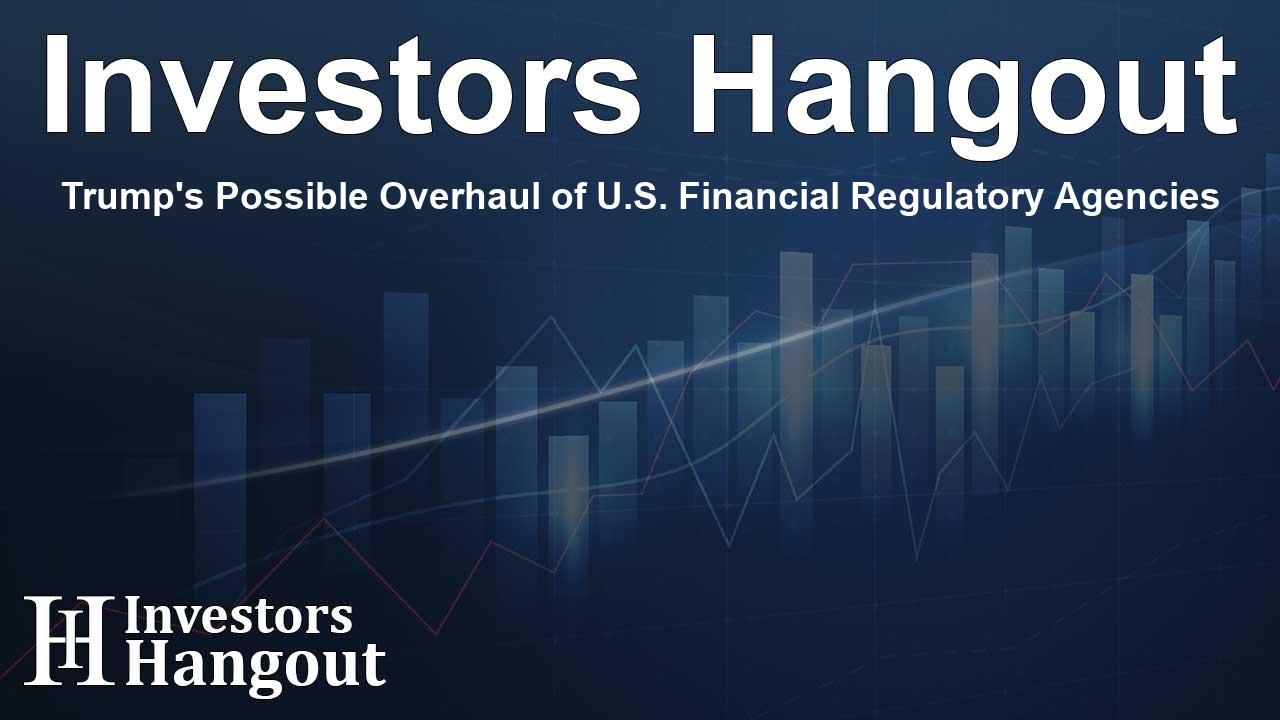Trump's Possible Overhaul of U.S. Financial Regulatory Agencies

Trump's Vision for U.S. Financial Regulators
As President-elect, Donald Trump stands on the brink of reshaping the landscape of U.S. financial regulators. With a mandate to streamline regulations that have expanded under previous administrations, Trump's approach targets various key agencies responsible for overseeing banks, private funds, and lending institutions. Understanding how he plans to exert control over these agencies could give us insight into the future of America’s financial policy.
U.S. Securities and Exchange Commission (SEC)
The SEC plays a vital role in safeguarding the integrity of the securities market. Currently led by Chair Gary Gensler, appointed commissioners are equally divided among Democrats and Republicans. Trump's arrival suggests a shift in leadership. Once Gensler resigns, Trump is likely to nominate one of the two Republican commissioners, Hester Peirce or Mark Uyeda, to serve as acting chair. There's ongoing speculation that Trump’s team might introduce external candidates, possibly leading to a Senate confirmation process.
The impending departure of Democratic commissioner Jaime Lizarraga allows Republicans to seize control of the SEC. This change is expected to accelerate the re-evaluation of crypto policies and potentially ease regulations that have hindered financial innovation in the past.
Commodity Futures Trading Commission (CFTC)
The CFTC is another crucial agency where Trump can make significant changes. Traditionally, the CFTC chair, currently Rostin Behnam, resigns when a new political party takes the White House. Trump is poised to appoint one of the Republican commissioners, either Summer Mersinger or Caroline Pham, to take charge as acting chair. The longer-term position will require Senate confirmation, and Trump's transition team is considering candidates outside current CFTC officials.
Consumer Financial Protection Bureau (CFPB)
The CFPB has historically been contentious concerning executive authority over its director. The Supreme Court ruling now empowers the president to dismiss the CFPB director without cause. Assuming Rohit Chopra, who heads the agency now, does not voluntarily step down, Trump is anticipated to remove him immediately. The determination of the acting director is likely to invoke partisan clashes reminiscent of previous conflicts during the Obama and Trump administrations.
Legal Considerations for CFPB Leadership
In prior disputes, such as with Leandra English, who claimed her position as acting director was rightful under the Dodd-Frank Act, the courts sided with the Trump administration. This precedent could allow Trump to appoint a new interim director without much contention. However, any permanent replacement would still require Senate vetting.
Federal Deposit Insurance Corporation (FDIC)
The FDIC, overseen by a board with a current Democratic majority, is prepared for a leadership change. Chair Martin Gruenberg's planned retirement opens the door for swift action by Trump. As the acting chair typically is the Vice Chair, Travis Hill is expected to ascend after Gruenberg's departure. Trump's administration will likely nominate him for the permanent role pending Senate confirmation.
Implications of Changes in the FDIC
With Trump likely to replace Chopra or Hsu, control over the FDIC would shift significantly. This power can facilitate major alterations in banking rules, directed to enhance economic stability and consumer protection while possibly rolling back previous restrictions deemed cumbersome.
Federal Reserve and its Future Direction
The Federal Reserve operates differently as firing views are contingent on cause. Currently, Vice Chair for Supervision Michael Barr retains his seat until mid-2026. While discussions within Trump's team about demoting Barr exist, it's unclear whether such action is within presidential powers. However, by consolidating control in other regulatory agencies, Trump could significantly influence Fed projects.
Potential Regulatory Changes Ahead
This could lead to significant shifts in the banking sector, particularly regarding initiatives tied to liquidity demands and capital requirements for banks. Steps toward reform may redefine how these financial institutions operate during economic fluctuations, addressing both market pressures and consumer needs.
Frequently Asked Questions
What changes is Trump expected to make to the SEC?
Trump is likely to nominate Republican commissioners to key roles, reshaping the regulatory approach, particularly concerning crypto policies.
How will the CFTC leadership change under Trump?
The CFTC chair, Rostin Behnam, is expected to be replaced with one of the Republican commissioners, prompting shifts in regulatory focus.
What is the significance of the CFPB's leadership during Trump's presidency?
Trump's power to remove the CFPB director strengthens presidential authority over consumer protection issues and can lead to substantial regulatory changes.
What does the FDIC's leadership change mean for banks?
Control over the FDIC will allow Trump to modify existing banking rules, potentially easing restrictions for financial institutions.
Will Trump's actions impact the Federal Reserve?
Yes, while he cannot directly fire Fed officials, a shift in regulatory authority in other sectors may influence Fed policies and actions significantly.
About Investors Hangout
Investors Hangout is a leading online stock forum for financial discussion and learning, offering a wide range of free tools and resources. It draws in traders of all levels, who exchange market knowledge, investigate trading tactics, and keep an eye on industry developments in real time. Featuring financial articles, stock message boards, quotes, charts, company profiles, and live news updates. Through cooperative learning and a wealth of informational resources, it helps users from novices creating their first portfolios to experts honing their techniques. Join Investors Hangout today: https://investorshangout.com/
Disclaimer: The content of this article is solely for general informational purposes only; it does not represent legal, financial, or investment advice. Investors Hangout does not offer financial advice; the author is not a licensed financial advisor. Consult a qualified advisor before making any financial or investment decisions based on this article. The author's interpretation of publicly available data shapes the opinions presented here; as a result, they should not be taken as advice to purchase, sell, or hold any securities mentioned or any other investments. The author does not guarantee the accuracy, completeness, or timeliness of any material, providing it "as is." Information and market conditions may change; past performance is not indicative of future outcomes. If any of the material offered here is inaccurate, please contact us for corrections.